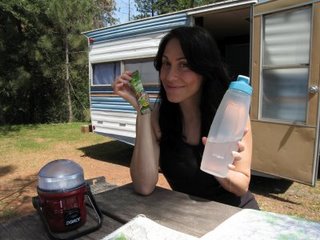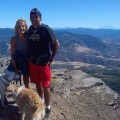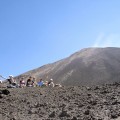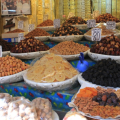by Carolyn The Healthy Voyager Scott
 Summer 2010 is here, and what’s more summer appropriate than camping? Whether you rough it, tent it or RV it, you won’t have all the comforts of home, making it easy to eat unhealthily – and to live un-environmentally. Below are some tips on how to make choices that are good for you and the planet!
Summer 2010 is here, and what’s more summer appropriate than camping? Whether you rough it, tent it or RV it, you won’t have all the comforts of home, making it easy to eat unhealthily – and to live un-environmentally. Below are some tips on how to make choices that are good for you and the planet!
- Be green and bring your own – dishes, that is! You can find lightweight dish wear designed specifically for camping at camping supply stores and online at REI. Avoid the disposable stuff—you’ll save your wallet and the environment. (And try to avoid using disposable bags, too.)
- Stock up on healthy snacks. Load up on treats like organic chips and salsa or guacamole and hummus with carrots. When off on hikes, bring energy bars to keep your hunger at bay without killing your insulin levels.
- Eat your veggies! Fruit is fairly easy to come by, but getting your greens is nearly impossible. Try making a big batch of green juice before you leave home and keeping it on ice during your trip. Juice spinach, kale, cucumber, celery, parsley, apple, lemon & ginger for a yummy yet healthy libation
- Drink lots of water!! Activities in the hot sun can lead to rapid dehydration. Keep liquefied and cool. Bring water in reusable or recyclable gallons. If you bring water in the 5 gallon bottles, invest in a hand pump. And be sure to dump “gray water” in designated areas, away from fresh water sources and not in the bushes.
- Bring enough receptacles to keep your trash separate from your recyclables. Some camp sites don’t offer recycling, so keep a bin for your recyclables, and dispose of them once you’re home.
- Fall off the grid. Keep your cell phones, iPods and computers charged with the sun by using solar panels instead of generators. A great stop for your portable solar needs is Sundance Solar. Opt for crank or shakable flashlights and crank radios, and as at home, replace disposable batteries with rechargeable.
- Stay within your site’s boundaries and on paths. Venturing into the forest threatens fragile plants, disrupts wildlife and leads to soil erosion. And every time you veer off a path, you create an opening for others to follow. So don’t do it!
- Keep campfires small and contained in a pit. Don’t burn plastic, metals or woods that have been treated with chemicals. If you use an outdoor grill, dump the ashes in your fire pit or dispose of them in designated areas.
- Follow the rules of the campsite. Especially the bathroom rules, as some sites may be on a septic system and anything other than what is supposed to go in toilets or drains can harm it. Be a mindful guest and a courteous camper — your fellow campers will thank you!
Camping with friends and family, or venturing out on your own can be incredibly fun – and even more so during the summer months. Just make sure you are prepared for the area you will be visiting, and be a cautious as well as conscious camper!
To locate great campsites around the country, be sure to check out Go Camping America or All Campgrounds.
Carolyn Scott is the executive producer, creator, host and writer of The Healthy Voyager brand. Her web series, radio show, site, blog and social network show you how to live, and travel, healthy & green. For more information, product recommendations and where to purchase, visit www.healthyvoyager.com






3 Comments
Chia (324 comments)
June 21, 2010 at 10:42 amHi Healthy Voyager, thanks for sharing. I enjoyed reading this blog. It’s a reminder that one of the main joys of camping is to become totally immersed in nature in every way possible, including doing our part to preserve it!
kindlizard (5 comments)
June 22, 2010 at 11:06 pmI just wanted to add my two cents as an avid vegan camper/backpacker. A lot of your suggestions are valid and important. There are a lot rules about responsible camping and waste that should be read before one ventures out and about.
Also, a few good ideas: if backpacking out in backcountry, always tell people where you are going and for how long. It’s just good sense folks.
But it seems your blog post was more geared toward car camping, or RV camping judging by the picture. When going to campsites and you are in an RV, try leaving some of your amenities at home. Like, why not try to leave the tv, lights, couch etc at home? I have seen too often folks just transport their living room to bother everyone else trying to get peace and quiet. As for computers and such, try breaking away while in the woods. Will not tweeting that you are out there really take away from your experience?
But as to food, the common theme here at HC, PLEASE reconsider the notion that those little tiny expensive “energy” bars are a good idea. First, they taste like cardboard, have been individually sealed in mylar, and sat on a shelf for a year. These things are the antichrist. The rage of water bottles that people are gradually realizing the perspective of their environmental devastation is similar to the waste that each little wasteful disposable wrapper is to the “energy” bar scene. Look, go to a HF store and buy in bulk, please! I see more little wrappers out in the woods than cigarette butts. Even if correctly packed out, that will never biodegrade, and the amount of energy used to create all that packaging far outweighs whatever energy you might potentially gain from them, even if you believe they are healthful, which I don’t. I contend they are over processed nuclear war safe items that lost any nutrition once they went to the factory.
Bulk items that are similar but less wasteful are carob bars w spirulina. They are great for trails. There are simple recipes here at happycow for making granola or trail mix (if not pm me) that is the real and true way to maintain health, cooking for yourself and taking it upon ourselves to take responsibility, which also reduces waste. Let’s use this site even more to promote truly healthy and eco-minded ways of being, not just the cliche ones that are themselves recycled.
As for plates, if you are car camping, don’t spend $$$ at REI, just bring along one that won’t break and is easy to clean.
My tips: if you have a food dehydrator, use it. Make meals in advance and then dehydrate them. Just adding water is a good idea out there, backpacking especially. Car campers w coolers, I think if its hot hummus is too fragile. Nut butters (I grind my own w my juicer) are truly helpful for car camping.
Thanks for mentioning not burning metal and plastic in campfires, that one is done in many places, oddly enough, nor should accelerants be used.
dancamp (1 comments)
August 10, 2010 at 8:53 pmI like your idea about green camping experience. Sometimes if people enjoys too much we neglect mother earth and abuse it. I just hope everybody would realize that nature is a gift that we have to treasure and protect. And camping will never be so much fun without the beautiful views around us brought about by mother nature.